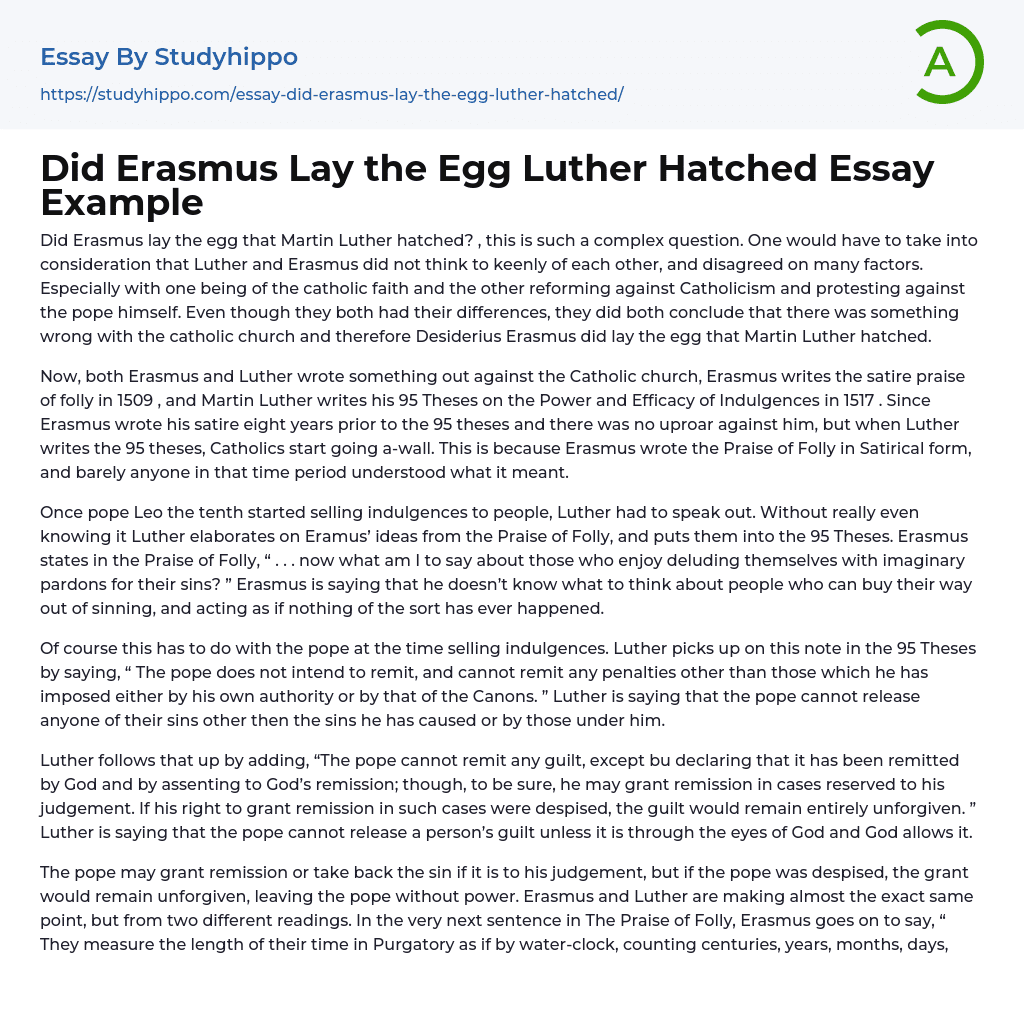Did Erasmus lay the egg that Martin Luther hatched? , this is such a complex question. One would have to take into consideration that Luther and Erasmus did not think to keenly of each other, and disagreed on many factors. Especially with one being of the catholic faith and the other reforming against Catholicism and protesting against the pope himself. Even though they both had their differences, they did both conclude that there was something wrong with the catholic church and therefore Desiderius Erasmus did lay the egg that Martin Luther hatched.
Now, both Erasmus and Luther wrote something out against the Catholic church, Erasmus writes the satire praise of folly in 1509 , and Martin Luther writes his 95 Theses on the Power and Efficacy of Indulgences in 1517 . Since Erasmus
...wrote his satire eight years prior to the 95 theses and there was no uproar against him, but when Luther writes the 95 theses, Catholics start going a-wall. This is because Erasmus wrote the Praise of Folly in Satirical form, and barely anyone in that time period understood what it meant.
Once pope Leo the tenth started selling indulgences to people, Luther had to speak out. Without really even knowing it Luther elaborates on Eramus’ ideas from the Praise of Folly, and puts them into the 95 Theses. Erasmus states in the Praise of Folly, “ . . . now what am I to say about those who enjoy deluding themselves with imaginary pardons for their sins? ” Erasmus is saying that he doesn’t know what to think about people who can buy their way out of sinning, and acting as if nothing of
the sort has ever happened.
Of course this has to do with the pope at the time selling indulgences. Luther picks up on this note in the 95 Theses by saying, “ The pope does not intend to remit, and cannot remit any penalties other than those which he has imposed either by his own authority or by that of the Canons. ” Luther is saying that the pope cannot release anyone of their sins other then the sins he has caused or by those under him.
Luther follows that up by adding, “The pope cannot remit any guilt, except bu declaring that it has been remitted by God and by assenting to God’s remission; though, to be sure, he may grant remission in cases reserved to his judgement. If his right to grant remission in such cases were despised, the guilt would remain entirely unforgiven. ” Luther is saying that the pope cannot release a person’s guilt unless it is through the eyes of God and God allows it.
The pope may grant remission or take back the sin if it is to his judgement, but if the pope was despised, the grant would remain unforgiven, leaving the pope without power. Erasmus and Luther are making almost the exact same point, but from two different readings. In the very next sentence in The Praise of Folly, Erasmus goes on to say, “ They measure the length of their time in Purgatory as if by water-clock, counting centuries, years, months, days, and hours as though there were a mathematical table to calculate them accurately.
Erasmus, being the intelligent man that he is, is actually mocking/making fun of the catholic
church’s faith, and belief of purgatory. Luther also has something to say about purgatory, “ With souls in purgatory it seems necessary that horror should grow less and love increase. ” Luther is saying that if purgatory existed, and there were souls in it, shouldn’t people fear it and peace would be more widespread. Both Martin Luther and Desiderius Erasmus are making the same points in two different pieces of historical literature.
Besides the fact that Erasmus and Luther did not have a liking towards each other, there is historical proof that they both had the same ideas, same points, and same beliefs against the catholic regime. One could spend all the time in the world comparing the Praise of Folly to the points made in the 95 Theses, but then they would have their own 95 Theses of how Luther hatched Erasmus’ egg. To conclude, these are to historical who may not get along, but in the end, they both had a certain level of hatred, or disliking towards a subject. Martin Luther Hatched the egg the Desiderius Erasmus Laid.
- Frederick Douglass essays
- Mahatma Gandhi essays
- Joseph Stalin essays
- Geert Hofstede essays
- George Eliot essays
- Ginevra King essays
- John Keats essays
- Siegfried Sassoon essays
- Ben jonson essays
- Billy elliot essays
- Wilkie collins essays
- John Proctor essays
- Harriet Tubman essays
- Napoleon essays
- Robert E Lee essays
- Rosa Parks essays
- Dred Scott essays
- Business Law essays
- Contract essays
- Consumer Protection essays
- Property essays
- Ownership essays
- Agreement essays
- Common Law essays
- Contract Law essays
- Justice essays
- Security essays
- Tort Law essays
- United States Constitution essays
- Crime essays
- Lawsuit essays
- Treaty essays
- Family Law essays
- Marijuana Legalization essays
- Constitution essays
- War on Drugs essays
- Court essays
- Jury essays
- Police essays
- Protection essays
- Community Policing essays
- Criminal Law essays
- Judge essays
- Lawyer essays
- Employment Law essays
- Copyright Infringement essays
- Injustice essays
- Intellectual Property essays
- Breach Of Contract essays
- Jurisprudence essays




